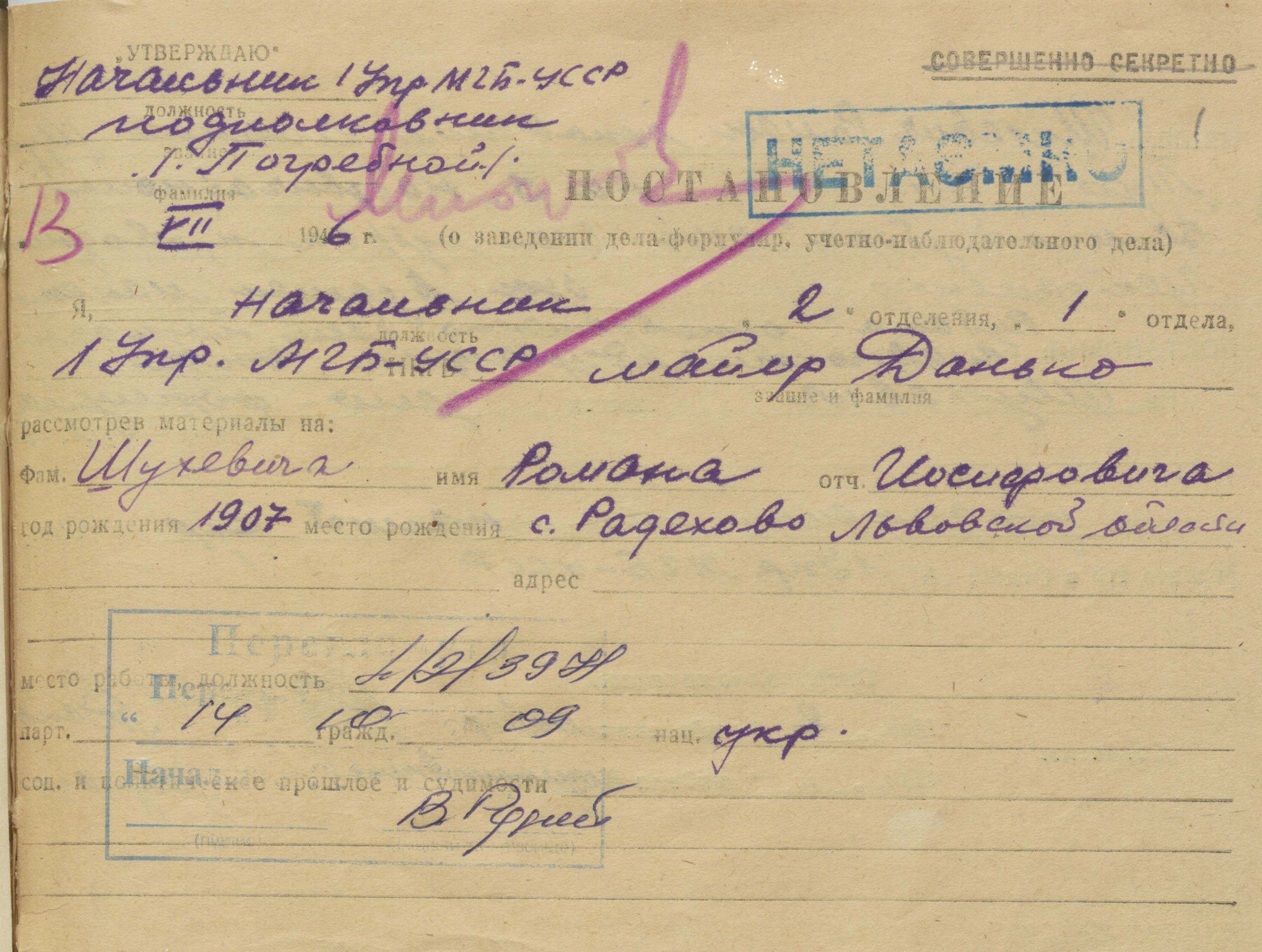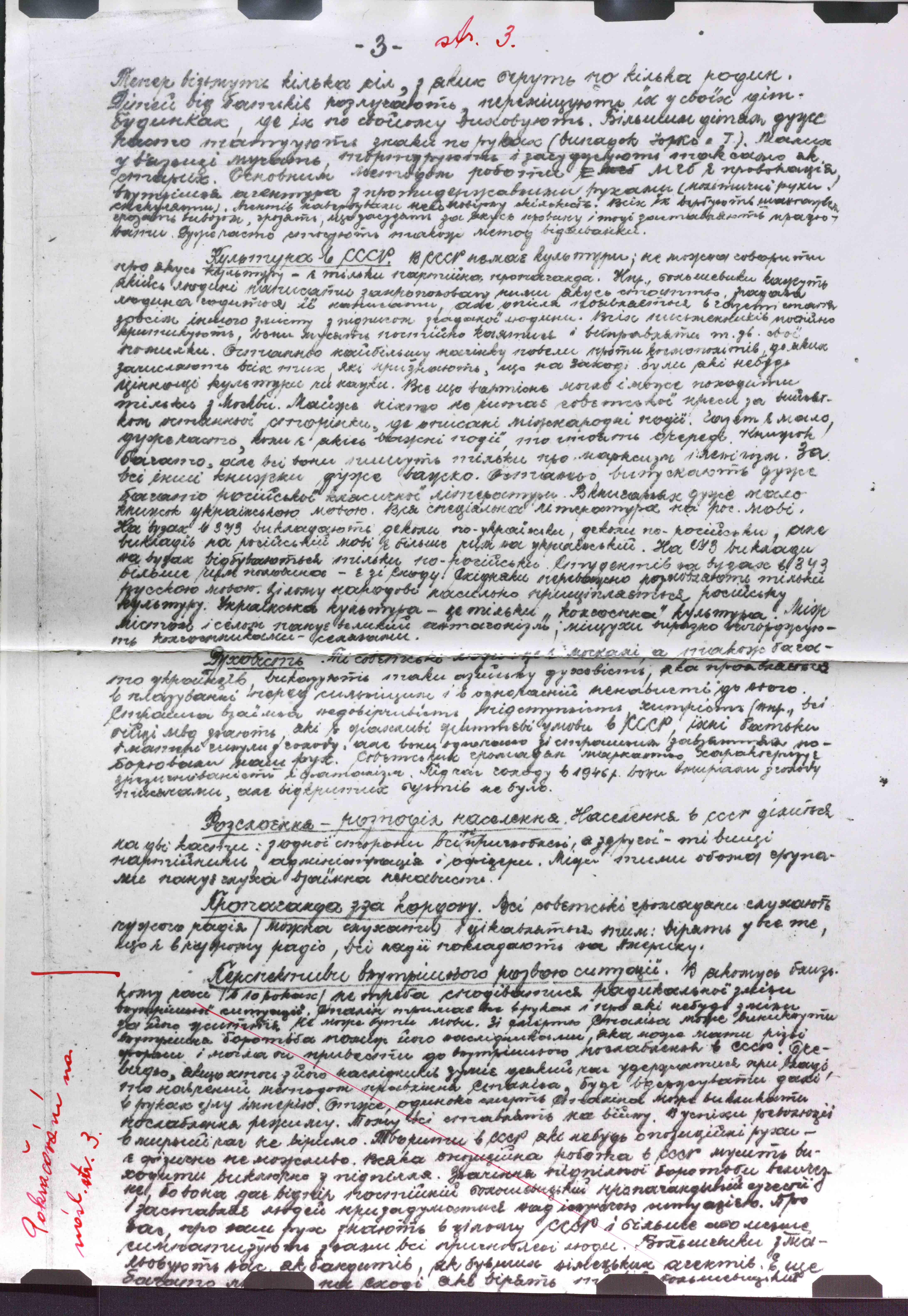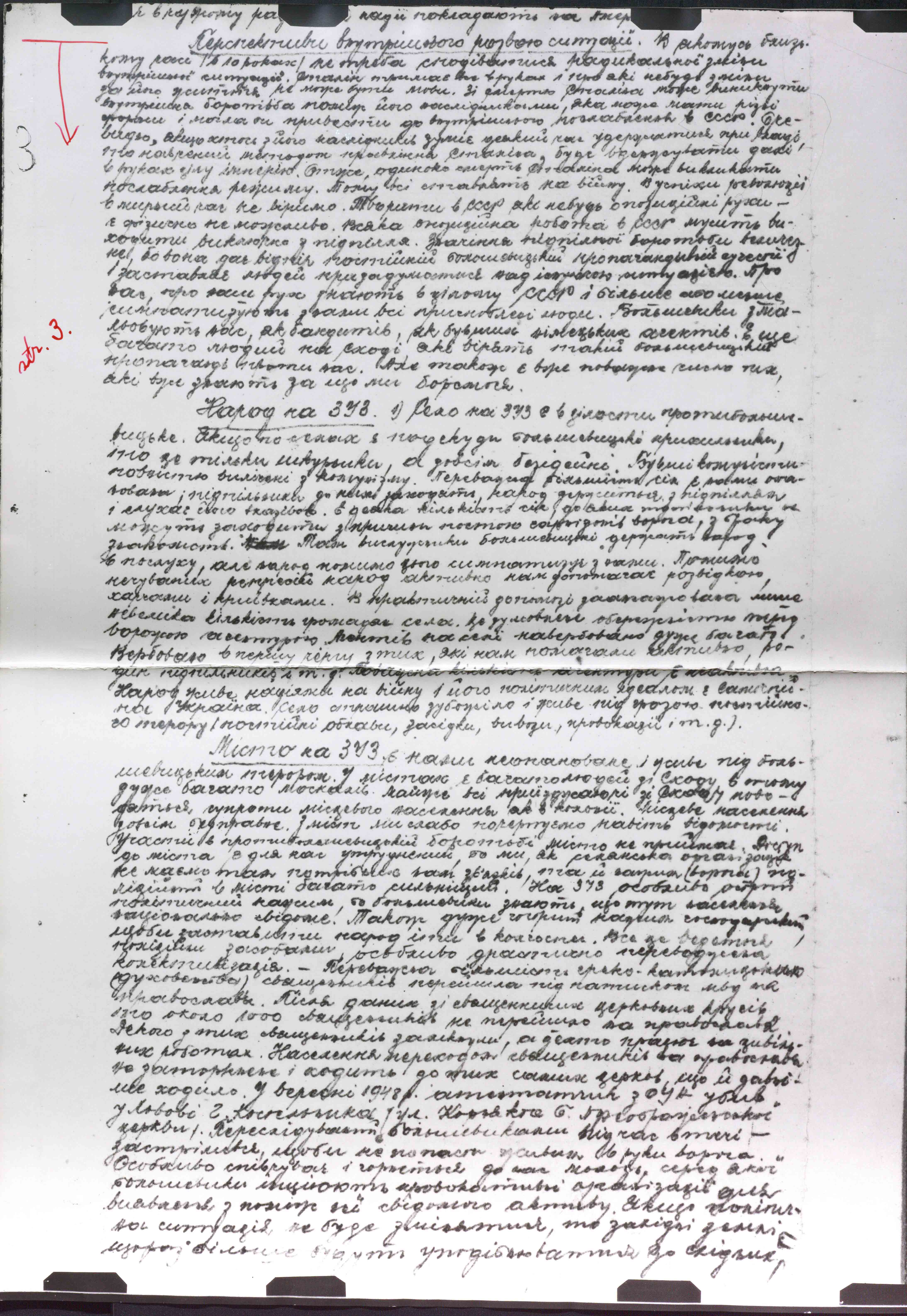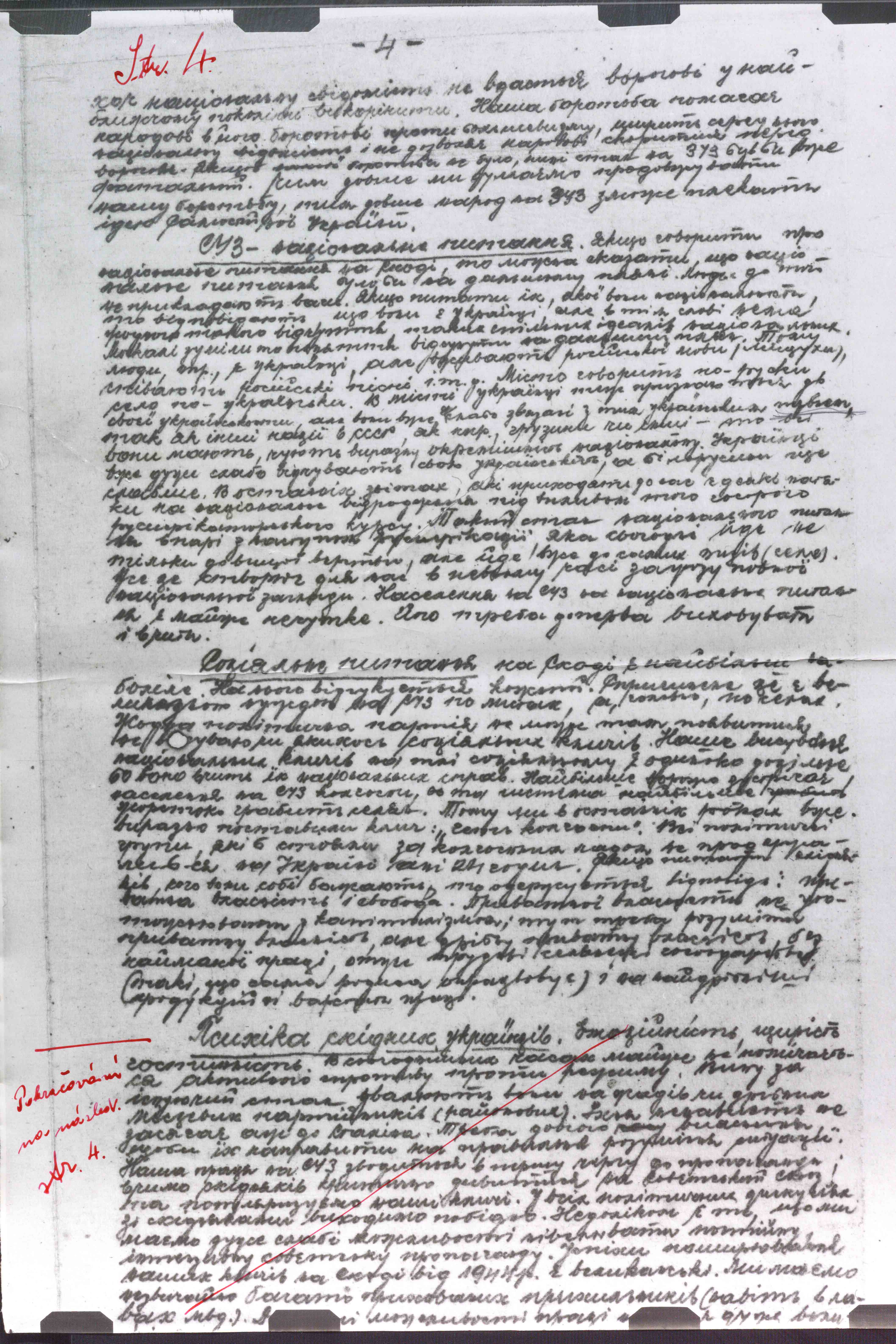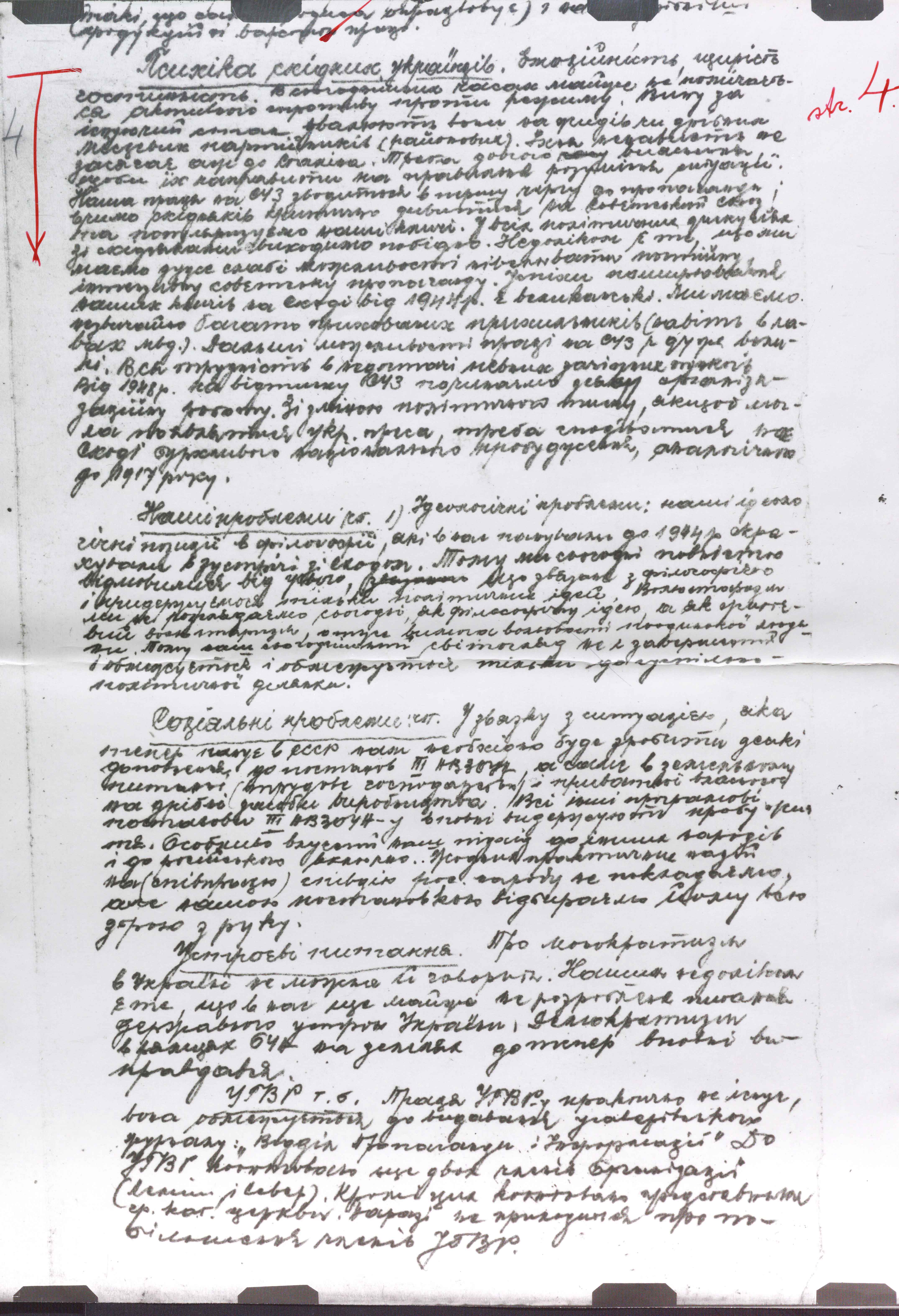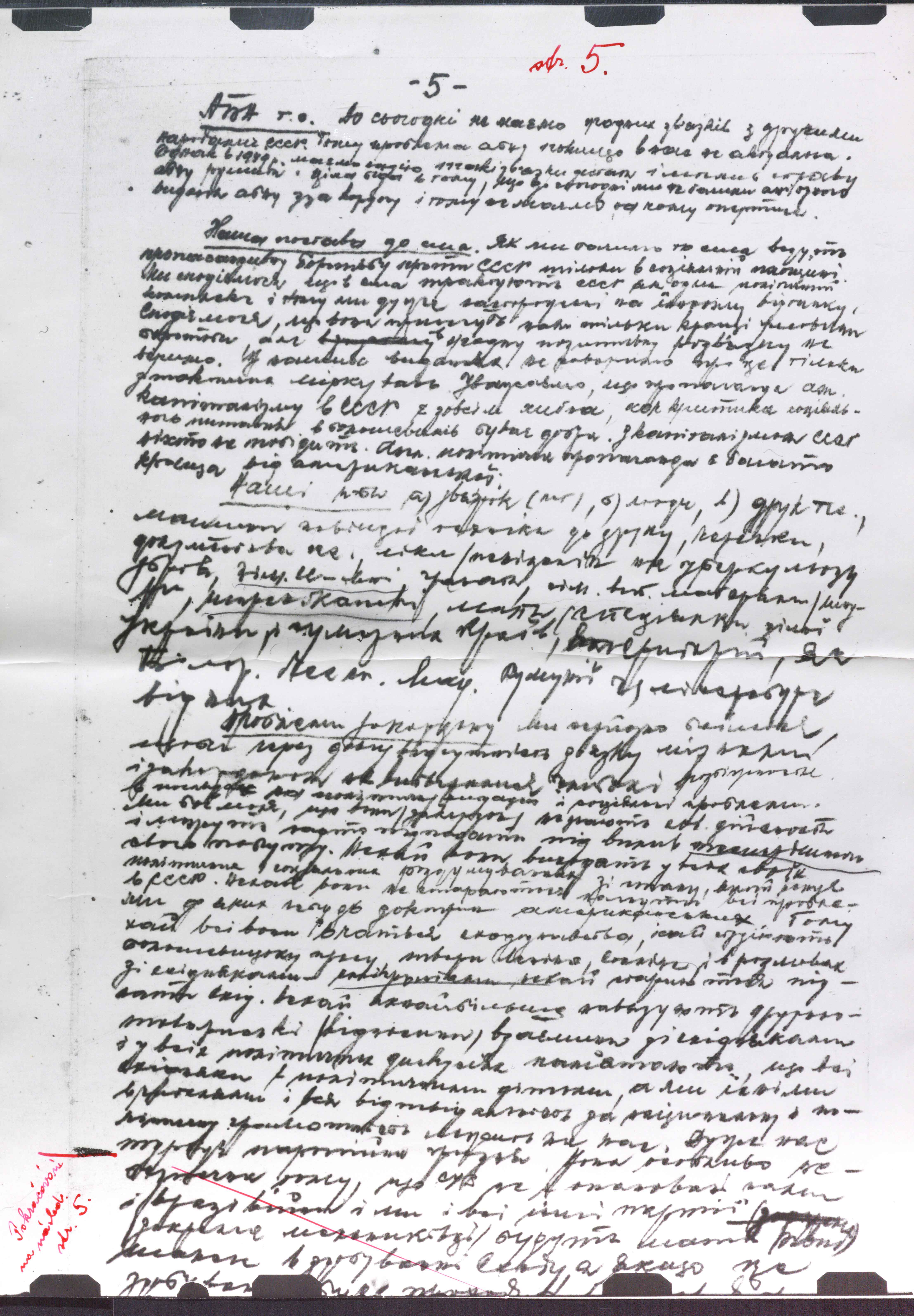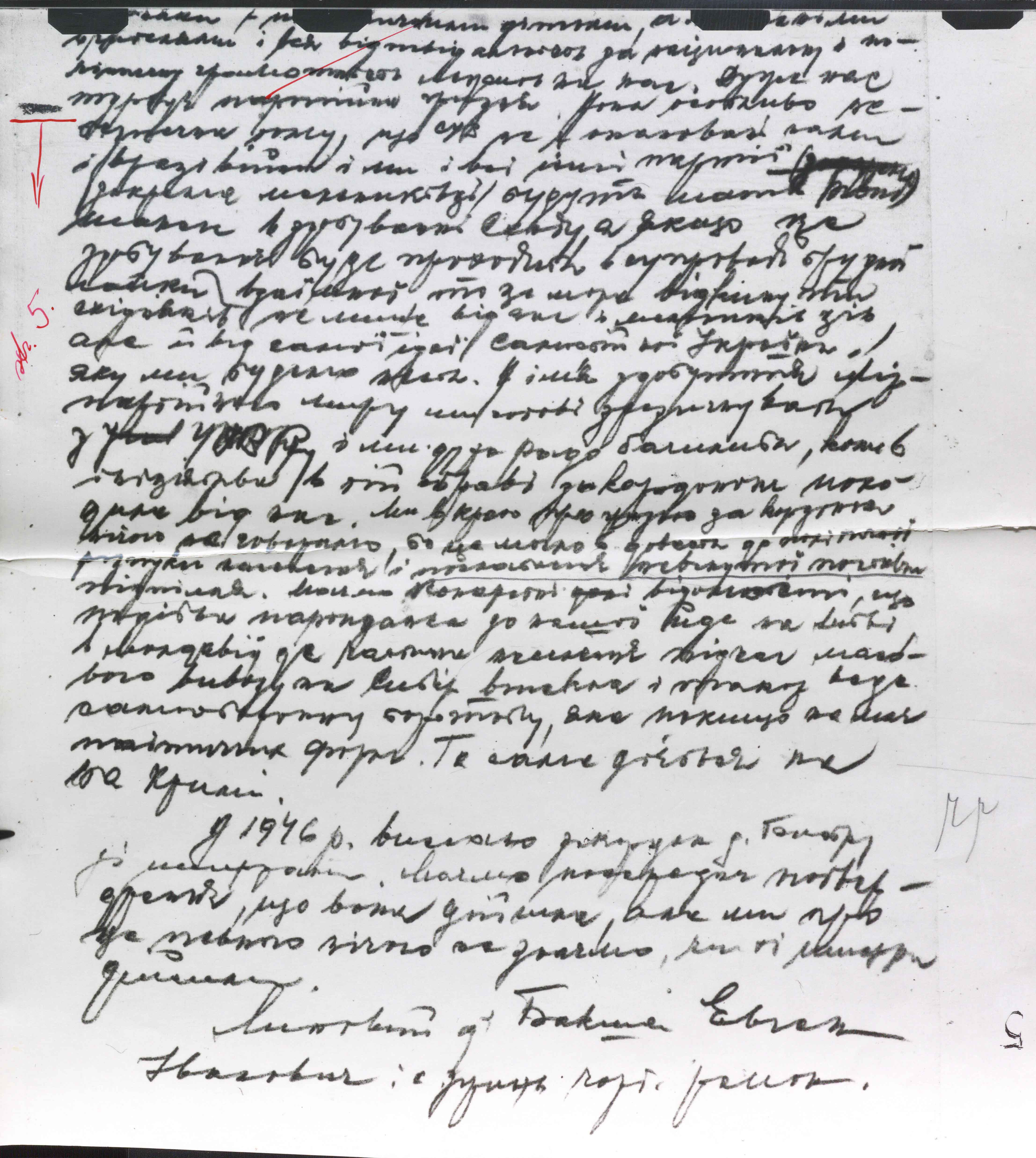Roman Shukhevych. The Last Report of the Commander-in-Chief of the UPA To the 116th anniversary of his birth (June 30, 1907)
6/30/2023
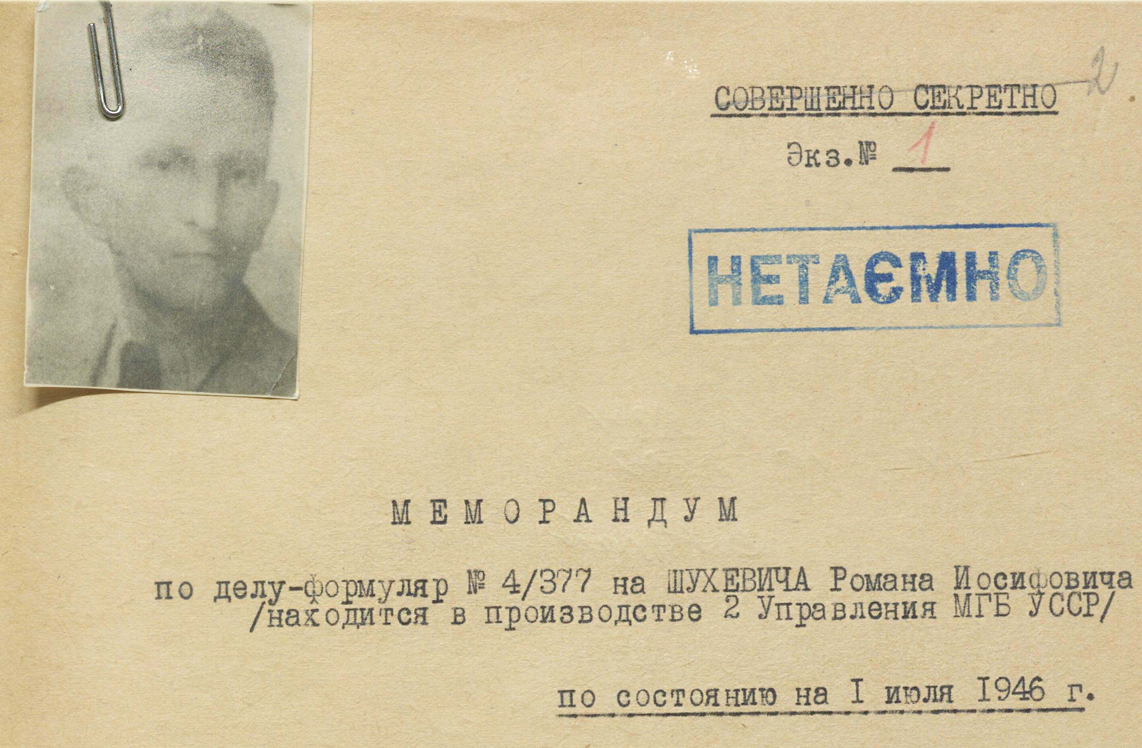
A look at the last years of the life and work of UPA Commander-in-Chief Roman Shukhevych through the prism of declassified documents of the NKVD/MGB of the Ukrainian SSR shows that he had no illusions about how a free and independent Ukraine should emerge, namely, by force of arms in a fierce struggle against Muscovites. To this end, according to him, it is necessary to thoroughly study the enemy, know his moods, psychology, strengths and weaknesses and, which is very important, not to have disbelief in our ranks. He wrote about this in his last report, a handwritten version of which was found in the archival funds of the Intelligence.
Chekists Called Him “Wolf”
Investigative operations cases, cases of agent cultivation, and cases against Roman Shukhevych began to be actively started by the NKVD in 1944. At that time, there was a surge in reports on the activities of the Ukrainian Insurgent Army and its leaders. First, in their documents, the Chekists sometimes mistakenly called Klym Savur (commander of the UPA-North) the Commander-in-Chief of the UPA. But soon they were clearly aware of who really led the entire insurgent movement.
At this, the documents and plans regarding R. Shukhevych, unlike the cultivation of some other active figures of the national liberation movement, establishing possible operational contact with him, making him collaborate, compromising or discrediting him were out of the question. From the very beginning, the task was clearly set: to track down and liquidate. There was no alternative.
The main cultivation and search was carried out by the Directorate 2-n of the NKGB/MGB of the Ukrainian SSR (a unit entrusted with the task of fighting the resistance movement of the OUN and UPA and centers of Ukrainian nationalists abroad). In 1944, the People's Commissar of State Security of the Ukrainian SSR Serhiy Savchenko approved the operational plan “Barlih” (“Lair” – Transl.), aimed at finding and liquidating members of the OUN Leadership and R. Shukhevych himself, and in 1945 a form case was first opened against him, and soon – an operational-search case, which the Chekists gave a code name “Vovk” (“Wolf'” – Transl.).
At the same time, intelligence units also kept case files against R. Shukhevych. In particular, in archival documents there is a mention that back in 1941, the 5th (Intelligence) Directorate of the UGB NKVD of the Ukrainian SSR opened a registration case file No. 837 on the basis of reports from foreign agents. These reports state that “Roman Shukhevych – pseudonym “Shchuka” – a member of the Central Committee of the UNA (Ukrainian National Association) is a liaison assistant to the head of the insurgent headquarters of the Bandera Provid of the OUN in the city of Krakow... Being on the side of Banderites, Shukhevych was a member of the commission for settling contradictions between Banderites and Melnykites” (BSA of the SZR of Ukraine. – F. 1. – Case 8162. – P. 27).
On July 13, 1946, the 1st (Intelligence) Directorate of the MGB of the Ukrainian SSR opened a new case file against R. Shukhevych. The resolution on the case states: “Shukhevych Roman, OUN pseudonyms “Shchuka”, “Tur”, “Chuprynka”. At the 3rd Extraordinary Great Assembly of the OUN was elected leader of the Central Provid of the OUN instead of Maksym Ruban, at the same time was appointed Commander-in-Chief of the UPA” (GDA SZR of Ukraine. – F. 1. – Spr. No. 8162. – Ark. 1).
The case contains a document based on Case 4/374 against R. Shukhevych, which was led by Directorate 2-n. In it, the Commander-in-Chief of the UPA was characterized as “a career Ukrainian nationalist-fanatic”, “a rather talented military professional, comprehensively developed, enjoying great authority among prominent figures of Ukrainian nationalism, under his leadership all military training and activities of the OUN were conducted”. And at the end the paper points out: “In the operational plan for the case-file on R. Shukhevych, measures are planned to find direct agent approaches to him in order to liquidate. Agents “Greyev”, “Naimychka” and “Viktor” will be used to carry out the special measures planned in the case” (BSA of the SZR of Ukraine. – F. 1. – Case 8162. – P. 28).
These materials are dated November 1944. Therefore, reports of agents and protocols of interrogations of OUN figures captured by the NKGB at that time allowed the Chekists to objectively assess R. Shukhevych’s role and place in the Ukrainian liberation movement, his being dangerous for the Kremlin, which repressively pursued its policy in Western Ukraine.
UPA Detachment Surrounded by American Tanks
After World War II, the Soviets mobilized enormous forces against the Ukrainian national resistance movement in Western Ukraine. The Kremlin was aware that the activities of the UPA impeded the establishment of communist power there, negatively affected the mood in society, and made an unfavorable (for the communist regime) impression on the world community.
Huge forces were thrown to suppress and defeat the underground. In each district center and more or less impressive settlement, a military garrison was placed. Operational-Chekist groups and destruction battalions were in constant combat readiness. They organized mass raids on insurgents, acted with tricks and insidious methods, dressing in UPA uniforms, persecuted and intimidated local residents who supported the UPA.
The underground suffered significant losses, but did not stop fighting. The Ukrainian liberation movement turned out to be well-organized, ideologically hardened and uncompromising in its desire at all costs to preserve forces until the beginning of a possible new armed conflict between the countries of the West and the USSR, which would give another chance to win Ukraine's independence.
At the same time, participants of the resistance movement, who found themselves in a rather difficult situation, were forced to finally switch from offensive (insurgent ) to defensive (deeply underground) tactics of struggle. The new tactics consisted in conspiratorial political and combat operations in the underground, avoidance of large-scale armed clashes, moving to using small units in fighting. R. Shukhevych himself was engaged in developing new tactical schemes. At this, he tried to constantly convey to the foreign units of the OUN the information about what was happening on the Ukrainian territory, he wanted everyone to know that the underground lives, acts, has and builds up forces for a new stage of struggle.
According to archival documents, in 1945 the UPA organized raids into Poland, Czechoslovakia and Romania, promoting the ideas of the Ukrainian liberation movement. In subsequent years, there were attempts by individual groups to break through the border and reach Western countries. One of such episodes is mentioned in the message “To friends Tur, Shelest or Pavur” from the OUN activist Derkach, dated 1948. This message through a network of emissaries and couriers was to reach one of the addressees mentioned in the appeal: “Tur” – Roman Shukhevych, “Shelest” – Vasyl Sydor, Commander of the UPA-West, or “Pavur” – Pavlo Myhal, at that time the head of the Chortkiv District Provid of the OUN. But the MGB intercepted the mesage and it never reached its destination.
The message conveys the wish from the Foreign Center of the OUN: “To withstand and once again to withstand. If necessary, from time to time let the Bolsheviks know that you still exist”. Besides, it tells about the political life abroad, relations between different Ukrainian political currents and describes in detail how information about the activities of the UPA was perceived in the West.
“Some, under the influence of the Bolshevik representatives, considered this movement as a bandit one”, the message points out, “others changed everything, there were few who correctly imagined all this... When the UPA arrived in the American zone, they made everyone shut up. The UPA had been arriving in the American zone through Czechoslovakia from September to November 1947. The first to arrive was Hromenko’s group– 37 people. The entire European press wrote about the fighting in Czechoslovakia, and the Americans did not know what to believe. They thought it was a Bolshevik provocation. An order was received from Washington to strengthen the border and not to let anyone in, and, if necessary, to shoot. On this issue, the Americans consulted with the ABN (Anti-Bolshevik Bloc of Nations). It was finally decided that if the UPA surrendered, they would be interned. The first group was encircled by tanks. The men did not want to surrender, but upon the word of honor of the American officer that they would not be extradited to the Bolsheviks, they laid down their arms. They were placed in barracks, and soon afterwards those who came later were added to them. In total, there were more than 200 people. Various people from intelligence agencies and journalists visited them and they gave interviews”.
The text then points out that Americans wondered how they could fight like that in such terrible conditions, being short of weapons and everything else necessary for armed struggle and normal survival in the deep underground, in forests and hideouts. “Your printed propaganda would not have done what these men did”, they stated (BSA of the SZR of Ukraine. – F. 1. – Case 8162. – P. 79-89).
Finally, the message mentions that various representatives approached those who arrived from the Ukrainian territory with requests to fill out intelligence questionnaires and offers of cooperation, “to which the men wrote them an answer like the letter to the Sultan”.
Archival documents do not answer the question whether this message reached R. Shukhevych. At the same time, the case file contains a photocopy of the handwritten version of the Commander-in-Chief of the UPA’s report, addressed to the OUN Central Provid abroad.
“Our Struggle Does Not Allow the People to Surrender to the Enemy”
The report is written in legible neat handwriting on 10 sheets. It is accompanied by a map and a few notes with the signature “Tur”, dated May 1949. One of them states: “My friend! Please contact the deliverer of this letter, Dr. Martin Mizernyi, with a person who can confirm the identity of his person. After asserting his identity, I ask you to connect him with the OUN Provid. Glory to Ukraine! May 49. Tur” (BSA of the SZR of Ukraine. – F. 1. – Case 8162. – P. 170). Another note, addressed directly to the Leader, i.e. Stepan Bandera, also refers to Martyn Mizernyi, whose identity R. Shukhevych recommends to be confirmed by a number of persons whom he names, and adds that he asks to receive him with full confidence.
At the same time, a report from Kyiv addressed to the chief of the 1st Directorate of the MGB USSR, Major General Georgy Utekhin, provides details that allow us to learn more about this report. The document points out that the report “was seized from bandits who left Ukraine through Czechoslovakia and were killed during an armed clash on the territory of Czechoslovakia”. Besides, it confirms that the report was addressed to S. Bandera through Myroslav Prokip, Ivan Hryniokh, Volodymyr Stakhiv, Daryna Rebet and her husband Lev Rebet. In the comments, the leadership of the MGB of the Ukrainian SSR noted that the leaders of the Ukrainian underground, as is clear from the report, were very concerned about the long absence of communication with abroad, which could lead to a misperception by the leaders of the Central Provid of both Soviet reality and their real assessment of the OUN underground. Therefore, R. Shukhevych allegedly decided to provide detailed information on the main directions of social and political life (BSA of the SZR of Ukraine. – F. 1. – Case 8162. – P. 144-145).
The report has a number of thematic sections: work in the organization, problems of the UPA, about the enemy, internal policy of the USSR, national issue, culture, spirituality, social problems, special services, prospects for the development of the situation, problems abroad and others. In them, R. Shukhevych, on the basis of the materials collected by the insurgent intelligence and, in general, all structural units of the UPA, characterized the situation and described his attitude to all sorts of events and phenomena.
Here are just some quotes from the report.
“Politics inside the country.
A whole life in the USSR is one military camp. The biggest agitational cry is “rodina”, “otechestvo” (“Motherland”, “Fatherland”, respectively – Transl.) (earlier it was “revolutsia”(“revolution”- Transl.) and therefore terrible chauvinism. That (war) military camp is permeated with incredible terror...
The National Question.
Forceful Russification rules everywhere. Russian songs and the Russian language are imposed on non-Russian people. All this is done not formally, but so to speak de facto. Ukrainians are actually called “khokhols” and the Ukrainian language is called “collective farmers’”. In Lviv, the spoken language is Russian. All this Russification onslaught takes place under strong terror. The same thing is happening on all national territories...
The MGB- police actually holds the entire USSR in its hands. It covers all spheres of life. Every smallest cell in public life should have at least one MGB agent or officer. They have the right to do whatever they want with the entire population. The complete arbitrariness of the MGB reigns. The entire population is kept by fear of their so-called correctional labour camps...
Children are separated from their parents, placed in their orphanages, where they are brought up in their (occupiers- Transl.) own way... The little ones in prison are tortured, and they are sentenced just like the adults.
Culture in the USSR.
There is no culture in the USSR; There is no culture worth talking about – only the party propaganda... All writers are constantly criticized, they must constantly repent and correct their so-called mistakes. The latest biggest attack was waged against cosmopolitans, who include all those who recognize that there were some values of culture or science in the West. Everything that is worthwhile could and can only come from Moscow...
Spirituality.
Those Soviet people who are Muscovites, as well as many Ukrainians, show Asian spirituality, which manifests itself in licking the boots of the stronger and at the same time hating him. Terrible mutual incredulity, deceit, cunning (for example, all the fighters of the Ministry of Internal Affairs know how terrible living conditions in the USSR are, their fathers and mothers starved to death, but at the same time they fought our movement with terrible zeal...
Prospects for the Internal Development of the Situation.
In some nearest year (in 10 years) one should not hope for a radical change in the internal situation. Stalin holds everything in his hands and any changes are out of the question while he is alive. With Stalin's death, an internal struggle among his followers could arise, which could take many forms and could lead to internal weakening in the USSR. Obviously, if one of his successors manages to stay in power for some time, then, trained by methods of Stalin's rule, he will continue to hold the whole empire in his hands. Thus, only Stalin's death could cause a weakening of the regime. Therefore, everyone relies on war. We do not believe in the successes of the revolution in peacetime. It is physically impossible to create any opposition movements in the USSR...
The whole USSR knows about us, about our movement, and all oppressed people sympathize with us more or less. The Bolsheviks portray us as bandits, as former German agents. There are still many people in the east who believe such Bolshevik propaganda against us. But there is also already a respectable number of those who already know what we are fighting for.
... Our struggle helps the people in their struggle against Bolshevism, spreads national dignity among them and does not allow the people to surrender to the enemy. If there had been no struggle, today the situation in the Western Ukrainian lands would have been fatal. The longer we intend to continue our struggle, the longer the people at the Western Ukrainian Lands will be able to cherish the idea of an independent Ukraine”(BSA of the SZR of Ukraine. – F. 1. – Case 8162. – P. 170).
Along with a photocopy of the handwritten version of the report, the case-file contains a translation from Ukrainian into Russian, which was made and certified by the chief of Directorate 2-n of the MGB of the Ukrainian SSR, Captain Pushkin. It is characteristic that in the Russian-language text, instead of the name of Stalin, a dash was made, because the context was negative. And those security officers could not afford that even in this version. Most likely, later the surname was entered by hand. Four copies of the report were handed over to Directorate 2-n of the MGB of the Ukrainian SSR, and the fifth – to the Secretariat of the MGB of the Ukrainian SSR.
A copy was sent to Moscow on February 28, 1950. In those days, the hunt for the UPA Commander-in-Chief had already entered a decisive stage. A few days later, on March 5, he died in the village of Bilohorshcha, Lviv region, trying to escape from the encirclement by operational-Chekist units, detachments of the regular army and internal troops of the MGB of the USSR.
The circumstances of the death and the details of the MGB operation were not found in the archives of intelligence. This was directly handled by Directorate 2-n and other specially created groups under the supervision of a representative from Moscow, General Pavel Sudoplatov. And the case-file in the BSA of the SZR of Ukraine ends in a resolution on its closure due to the death of R. Shukhevych and attaching to it an envelope with a handwritten report and a number of accompanying notes, each of which ends with the words: “Glory to Ukraine! Tur”.
